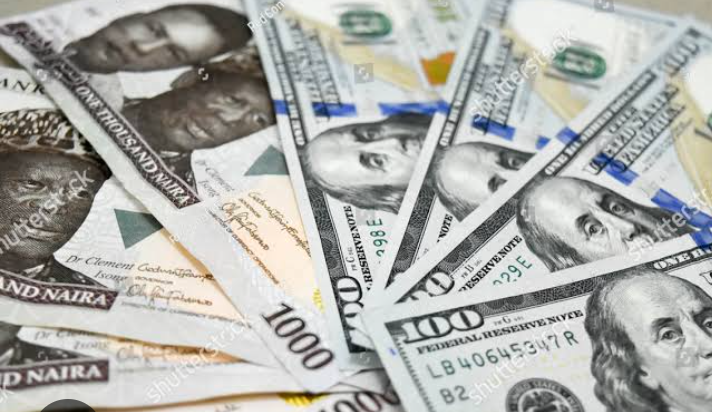News
SEE Dollar to Naira Exchange Rate at Black Market ( July 3, 2024: USD to NGN CBN Rate

What is the Dollar to Naira Exchange rate at the black market also known as the parallel market (Aboki fx) Today July 3, 2024?
Many Nigerians, especially those engaged in foreign trade, travel, and investment, have always been very interested in and concerned about the exchange rate between the US dollar and the Nigerian naira.
The parallel market, also known as the black market or Aboki FX, often offers a different rate from the official Central Bank of Nigeria (CBN) rates.
For many, this is a critical source of foreign exchange. See the black market Dollar to Naira exchange rate for July 3, 2024, below. At these rates, you can exchange your dollar for Naira.
How much is a dollar to naira today in the black market? Dollar to naira exchange rate at black market Yesterday (Aboki dollar rate): The exchange rate for a dollar to naira at Lagos Parallel Market (Black Market), yesterday, July 2, 2024, players buy a dollar for N1500 and sell at N1505 according to sources at Bureau De Change (BDC).
Please note that the Central Bank of Nigeria (CBN) does not recognize the parallel market (black market), as it has directed individuals who want to engage in Forex to approach their respective banks. Dollar to Naira Black Market Rate Today July 3, 2024 Dollar to Naira (USD to NGN) Black Market Exchange Rate Today Buying Rate N1510 Selling Rate N1515 Dollar to Naira CBN Exchange Rate The Central Bank of Nigeria sets the official exchange rates, providing stability through government regulation. As of now, the rates are: Dollar to Naira CBN Rate Today Dollar to Naira (USD to NGN) CBN Rate Today Buying Rate N1548 Selling Rate N1549
These rates reflect government policies aimed at stabilizing the naira and managing foreign exchange reserves. Businesses and individuals that prefer regulated transactions frequently rely on these rates. Please note that the rates you buy or sell forex may be different from what is captured in this article because prices vary. Dollar to Naira Exchange Rate at Black Market (Aboki FX) July 2, 2024: USD to NGN CBN Rate
Pounds and Euro to Naira Exchange Rates For those dealing with currencies other than the US dollar, here are the latest rates: Pounds to Naira (CBN Rates) Buying Rate: ₦1,963 Selling Rate: ₦1,963 Euro to Naira (Black Market Rates) Buying Rate: ₦1,662 Selling Rate: ₦1,665 These rates are also subject to market conditions and economic policies. Geegpay and Grey: online Exchange Platforms
Digital platforms like Geegpay and Grey offer convenient and secure options for currency exchange, providing competitive rates. Geegpay Dollar to Naira Rates EUR (€): Buying at ₦1,690.03, Selling at ₦1,695.55 GBP (£): Buying at ₦1,950, Selling at ₦1,965 USD ($): Buying at ₦1,480, Selling at ₦1,550 Grey Dollar to Naira Rates EUR (€): Buying at ₦1,640.03, Selling at ₦1,719 GBP (£): Buying at ₦1,902, Selling at ₦2,015 USD ($): Buying at ₦1,460, Selling at ₦1,500 These platforms have gained popularity due to their ease of use, transparency, and security, making them viable alternatives to traditional methods. Factors Influencing Black Market Rates Understanding the factors that influence the dollar to naira exchange rate in the black market can help anticipate changes and make better financial decisions.
Economic Policies Government policies significantly impact exchange rates. Decisions on interest rates, inflation control, and foreign exchange regulations by the Central Bank of Nigeria (CBN) directly affect the naira’s value. For instance, when the CBN adjusts policies to manage inflation or stabilize the naira, it impacts the exchange rate. Supply and Demand The availability of foreign currency versus the demand for it plays a crucial role. When foreign currency is scarce or demand is high, the naira depreciates, leading to higher exchange rates. Conversely, an abundant supply of dollars can lead to lower rates.
Political Stability Geopolitical events and internal political stability affect investor confidence. Political unrest or uncertainty can cause the naira to depreciate as investors move towards safer assets. Stability and positive political developments, on the other hand, can strengthen the naira. Global Economic Conditions Global market conditions, such as shifts in oil prices (a major export for Nigeria), international economic trends, and global inflation rates, influence the naira’s value. For example, a significant drop in oil prices can negatively impact Nigeria’s economy and the naira. Comparing Official and Black Market Rates There is a significant disparity between official and black market rates. The black market offers higher rates, but with substantial risks such as fraud and legal issues. The CBN advises using official channels to avoid these risks. Official rates are stable and reliable, making them suitable for the majority of transactions.
Why the Disparity Between Official and Black Market Rates? The disparity between the official CBN rates and the black market rates is influenced by several factors: Supply and Demand: The availability of foreign currency in the official market is often limited, leading individuals and businesses to seek forex in the black market where demand drives up prices.
Regulatory Restrictions: The CBN imposes restrictions on the amount of forex available for personal and business use, making it difficult for many to meet their needs through official channels. Economic Instability: Fluctuations in oil prices, inflation, and economic policies can create uncertainty, prompting people to turn to the parallel market for more favorable rates. Impact of Black Market Rates on the Economy
The high exchange rates in the black market can have various implications for the Nigerian economy: Inflation: Higher costs for imported goods can drive up prices locally, contributing to inflation. Investment: Unfavorable exchange rates can deter foreign investment as investors seek more stable economic environments. Trade: Exporters may benefit from higher naira values per dollar, while importers face increased costs, potentially leading to trade imbalances. How to use the parallel market For those needing to engage in forex transactions through the black market, safety and caution are paramount. Here are some tips:
Verify Rates: Always check the latest rates from reliable sources like Aboki FX to ensure you get the best deal. Deal with Reputable Dealers: Engage with well-known and trusted Bureau De Change operators to avoid scams. Stay Informed: Keep abreast of economic news and CBN policies that could affect exchange rates. FAQs on dollar naira exchange rate black market How much is a dollar to naira today in the black market? The buying rate is N1495, and the selling rate is N1500 as of June 23rd, 2024. Why does the black market offer higher rates than the CBN? The black market rates are driven by supply and demand dynamics, regulatory restrictions, and economic instability. Is it legal to trade forex in the black market? While the CBN discourages it, many engage in the black market due to the unavailability of sufficient forex through official channels. What are the risks of trading in the black market? Risks include fluctuating rates, potential scams, and the legal gray area of such transactions. Can the CBN influence black market rates? The CBN can influence these rates through monetary policy, forex interventions, and regulatory measures, but direct control is limited. How often do black market rates change? Rates can change on a daily or even multiple times per day, depending on market conditions and economic news. Conclusion on the Dollar-Naira Exchange Rate Black Market
The dollar to naira exchange rate at the black market reflects a complex interplay of economic factors, regulatory frameworks, and market dynamics. While it offers a critical alternative for many Nigerians seeking forex, it also underscores the challenges and opportunities within Nigeria’s broader economic landscape. Staying informed and cautious can help navigate this often volatile market effectively. Non-Bank Transactions Surge Threatens West Africa’s Financial Stability – Cardoso Yemi Cardoso, Governor of the Central Bank of Nigeria, has raised alarms about the rising volume of transactions by non-bank and Other Financial Institutions (OFIs), warning that this trend threatens West Africa’s financial stability. Speaking at the 10th meeting of the College of Supervisors for Non-Bank Financial Institutions in Abuja, Cardoso emphasized the vital role of non-bank financial institutions in promoting financial growth and inclusion in the West African Monetary Zone (WAMZ). Non-bank financial institutions provide essential services to underserved populations, including SMEs, without accepting deposits like commercial banks. Cardoso praised the adoption of the Model Act for Non-Bank Financial Institutions, a legislative milestone aimed at harmonizing supervisory practices across the WAMZ. Highlighting fintech innovations, Cardoso noted the rise in fintech loans, crypto, and stablecoin assets. He stressed the importance of monitoring these trends, as their increasing volumes pose significant risks to financial stability. Cardoso urged supervisors to bolster cybersecurity frameworks and adopt risk-based supervisory approaches to mitigate these risks. Yaw Sapong, Chairman of the College, highlighted the role of non-bank financial institutions in fostering financial inclusion and economic growth, calling for coordinated policy responses to current challenges. Dr. Olorunsola Olowofeso, Director General of WAMI, emphasized the need for resilience in the financial sector against emerging risks such as cyber threats and climate-related issues
The CSNBFI meeting aims to review progress in the NBFI sector and strategize on addressing current challenges, focusing on regulatory harmonization, cybersecurity, and the impact of digital innovations on financial services.
News
CBN announces revised documentation requirements for PAPSS transactions

The Central Bank of Nigeria (CBN) has announced a revised documentation requirement for transactions conducted through the Pan-African Payment and Settlement System (PAPSS) in Nigeria.
This was disclosed in a statement issued by the apex bank’s acting Director, Corporate Communications, Mrs. Hakama Sidi Ali
The CBN said the new initiative is part of its ongoing commitment to foster seamless intra-African trade, financial inclusion, and operational efficiency for Nigerians engaging in cross-border payments within Africa.
Launched by Afreximbank in partnership with the African Union and the African Continental Free Trade Area (AfCFTA) secretariat in January 2022, PAPSS serves as a centralized payment and settlement platform that enables instant, secure, and efficient cross-border transactions throughout Africa.
By facilitating payments in local currencies, PAPSS minimizes reliance on third-party currencies, reduces transaction costs, and supports the rapid expansion of trade under the AfCFTA.
In a recent circular referenced TED/FEM/PUB/FPC/001/006 issued on April 28, 2025, CBN outlined the key changes to the documentation requirements associated with PAPSS transactions.
The key changes it added take effect immediately and include simplified documentation for low-value transactions, which allows customers to now use basic KYC and AML documents provided to their authorized dealer banks for low-value transactions of up to $2,000 and $5,000 equivalent in naira for individuals and corporate bodies, respectively.
“For transactions above the thresholds, all documentation as stipulated in the CBN foreign exchange manual and related circulars remains mandatory,” the bank said.
Also, the CBN added that applicants are responsible for ensuring all regulatory documents are available to facilitate the clearance of goods, as required by relevant government agencies.
“Authorized dealer banks may now source foreign exchange for PAPSS settlements through the Nigerian foreign exchange market, without recourse to the CBN.
“All export proceeds repatriated via PAPSS shall be certified by the relevant processing banks.
“The Central Bank of Nigeria urges all banks to adopt PAPSS and commence originating transactions in line with this new policy.
“In addition, CBN encourages exporters, importers, and individuals to familiarize themselves with the new requirements and leverage PAPSS for cross-border transactions within Africa,” the statement said.
News
Reps Set Stage for Nigeria’s First Legislative Conference on Renewable Energy

By Gloria Ikibah
The House of Representatives is set to host the country’s first National Legislative Conference on Renewable Energy, aimed at driving new laws, attracting investment, and pushing Nigeria further along its energy transition journey.
This was revealed during a press briefing by the Chairman, House Committee on Renewable Energy, Rep. Afam Victor Ogene, who described the event as a turning point for energy legislation in Nigeria.
He said: “The conference aims at bringing together key stakeholders and industry players to discuss renewable energy legislations, energy transition, renewable energy financing, investment opportunities and related matters.
“It’s about developing a national legislative framework on renewable energy”.
The conference, which is being organised by the House Committee on Renewable Energy in partnership with the Office of the Speaker of the House of Representatives, and the United Nations Development Programme (UNDP), will take place under the UNDP Parliamentary Development Program.
Rep. Ogene noted that recent legal reforms have created space for state governments to play a more active role in Nigeria’s power sector. He pointed to the Fifth Alteration Bill 2022 (No.33), now signed into law, which allows states to legislate on electricity matters within the national grid. Before now, states could only act on off-grid power.
In addition, he highlighted the Electricity Act of 2023, which came into effect in February 2024.
“It permits states to issue licenses for all electricity activities – generation, transmission and distribution across the entire power sector value chain,” he said.
The Committee Chairman further stated that the new National Integrated Electricity Policy, expected in 2025, will guide states in forming new electricity markets, where solar power and other renewable sources will be key to reaching underserved communities.
Ogene explained, “The conference has three clear objectives:
“To promote dialogue among legislators, experts and stakeholders on critical legislative priorities.
“To establish a coordinated platform for federal and state lawmakers, and to produce a clear, time-bound legislative action plan.
“International partners are also on board. The Inter-Parliamentary Union (IPU) will participate, and parliaments from South Africa, Ghana and Gambia have confirmed attendance. Ghana is sending a three-man delegation led by the Deputy Speaker, Rt. Hon. Alban Kingsford Bagbin”.
In another major highlight, the Netherlands-based platform INCLUDE will host a Pan-African Legislative Dialogue session on renewable energy, to be chaired by the Hon. Speaker, Rt. Hon. Abbas Tajudeen.
“The session will focus on how to establish a unified legislative framework on renewable energy development, investment and financing.
“The time has come for us to act. This is not just another conference – it is the foundation of Nigeria’s renewable energy future”, Ogene added.
Expected outcomes from the conference include new policy and legislative reform proposals to boost renewable energy use, as well as draft laws that will encourage public and private sector investment.
Other goals are to enhance collaboration between federal and state lawmakers, raise public awareness, and roll out a practical roadmap for implementation and progress tracking.
The event will also feature a technology showcase of renewable energy innovations and business opportunities.
News
Alleged money laundering: EFCC produces Aisha Achimugu in court

By Francesca Hangeior
The operatives of the Economic and Financial Crimes Commission (EFCC), on Wednesday, arrived at the Federal High Court in Abuja with the businesswoman, Aisha Achimugu, as ordered by the court.
Achimugu, who was sandwiched by two female EFCC officers, arrived in court at about 11:35 am.
It could be recalled that Justice Inyang Ekwo had, on Monday, ordered the industrialist, alleged to have fled the country, to honour the invitation by the anti-graft agency on Tuesday at noon.
Justice Ekwo, who gave the order in a short ruling, also ordered the EFCC, upon the appearance of Achimugu at its office, to return with her to court on Wednesday for a report.
Achimugu was, however, said to have been arrested by the EFCC’s operatives on her arrival abroad at about 5 am and kept in custody.
-

 Metro9 hours ago
Metro9 hours agoGunmen storm University of Benin teaching hospital, kill doctor
-

 Politics21 hours ago
Politics21 hours agoJust in: Ex- Gov Okowa accepts betraying Southern Nigeria, laments running with Atiku
-

 Metro9 hours ago
Metro9 hours agoFCTA destroys 601 motorbikes over violations
-

 News9 hours ago
News9 hours agoJust in: FG declares tomorrow public holiday
-

 News21 hours ago
News21 hours agoBoko Haram Kill Mourners, Kidnap Others In Borno
-

 News21 hours ago
News21 hours agoDeputy Speaker Leads Defection of PDP Stalwart Chris Igwe, 13,000 Followers to APC In Abia
-

 News2 hours ago
News2 hours agoJUST IN: Major General Paul Ufuoma Omu Rtd, dies at 84
-

 News26 minutes ago
News26 minutes agoAlleged money laundering: EFCC produces Aisha Achimugu in court





